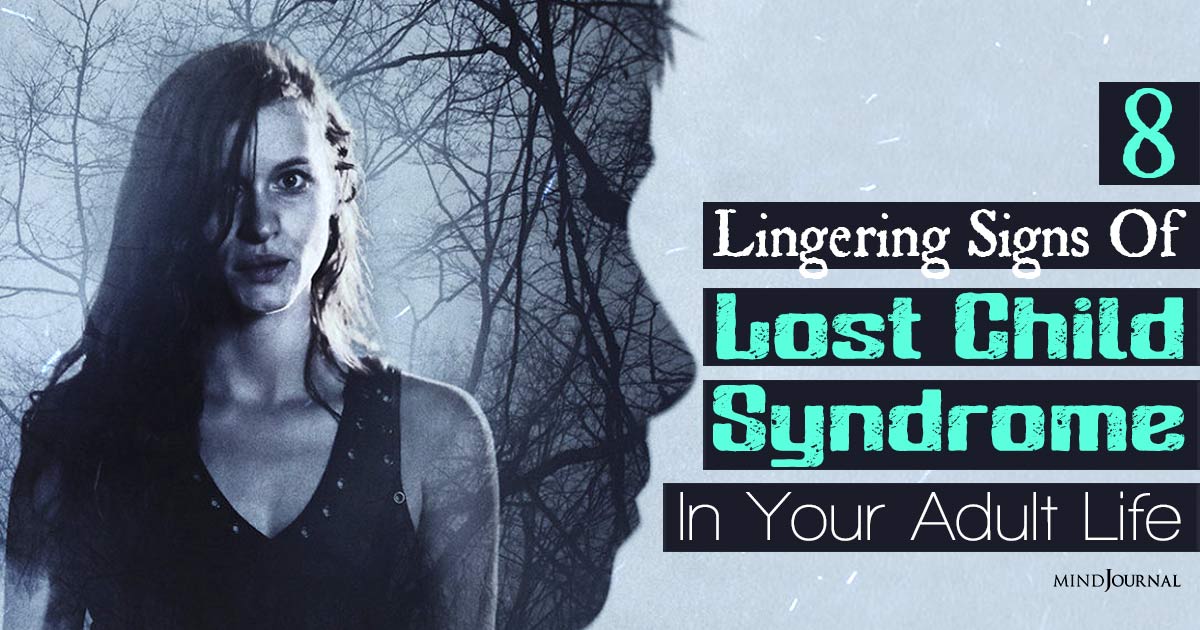Ever felt like you were the ‘invisible’ one growing up? This can affect your adulthood in unexpected ways. Let’s explore the signs of lost child syndrome and their impact.
What Does Being A Lost Child Mean?
The term ‘Lost Child’ refers to a role often played within dysfunctional families, where one child becomes invisible, neglected, and emotionally isolated.
And with the help of this article, we will explore the signs of Lost child syndrome and how it can impact your life as an adult, shedding light on the hidden struggles that many face.

Read more here: How Children Of Obsessed Parents End Up Feeling Lost and Empty
Signs Of Lost Child Syndrome
If you’re wondering whether you might have grown up as a Lost Child or if you’re curious about this phenomenon, read on…
1. A strong need for solitude
As a Lost Child, you likely grew up seeking refuge in solitude. While this can be a coping mechanism, as an adult, it may make it challenging to form close relationships or feel comfortable in social situations.
2. Difficulty expressing emotions
Being the lost child you may have experienced emotional neglect which can lead to difficulties in recognizing and expressing your feelings as an adult. You might find it hard to open up to others or even identify your own emotions accurately.
3. Low self-esteem
One of the signs of lost child syndrome is that you grow up feeling invisible can lead to a profound sense of inadequacy. As an adult, you might struggle with self-worth and may constantly seek validation from others, making you susceptible to manipulation and toxic relationships.
4. Avoidance of conflict
Being the lost child often means avoiding conflict at all costs. While this can be a survival strategy within a dysfunctional family, as an adult, it may hinder your ability to assert yourself, leading to passive behavior and unhealthy relationships.
5. Difficulty setting boundaries
Lost children often have blurred boundaries, making it challenging to establish healthy limits in relationships. You may have a tendency to sacrifice your own needs to please others, which can lead to emotional exhaustion.
6. Fear of vulnerability
Growing up emotionally isolated can instill a deep fear of vulnerability. As an adult, this fear may prevent you from forming deep connections, as you may equate vulnerability with weakness.
7. Struggles with decision-making
A lack of autonomy during childhood can result in difficulties making decisions as an adult. You may second-guess yourself constantly and feel overwhelmed by the simplest choices.
8. Difficulty trusting others
Being the invisible child often means not receiving the support and care you needed. This can lead to a deep-seated mistrust of others, making it challenging to build trust in adult relationships.
The Lost Child Personality As An Adult
The experiences of being a lost child can shape your personality in various ways:
1. Self-reliance: You may have developed a high degree of self-reliance as a coping mechanism, which can serve you well in some aspects of adult life, but it may also make it challenging to ask for help or rely on others.
2. Independence: One trait of a lost child personality as an adult is when becoming fiercely independent, which can be an asset, but it can also lead to isolation and a reluctance to let others in.
3. Empathy: Paradoxically, the experience of being neglected can make you highly empathetic towards the pain of others. You may become a good listener and empathetic friend, but may struggle to receive the same support in return.
Read more here: Dysfunctional Family Roles: The 5 Child Roles In Dysfunctional Families
How You Can Heal From Being the Invisible Child
If you relate to any of the signs of lost child syndrome, here are some steps you can take to heal and grow:
- Self-awareness: Recognize the signs of lost child syndrome in your own life. Being self-aware is the first step toward growth and healing.
- Seek therapy: Therapy can be a valuable tool in unpacking the emotional baggage from your past and learning healthy coping strategies.
- Build a support network: Cultivate relationships with friends and loved ones who can offer emotional support and validation.
- Practice self-compassion: Be kind to yourself and acknowledge that the struggles you face are not your fault.
- Learn to set boundaries: Developing healthy boundaries is essential for building fulfilling relationships and protecting your own well-being.
Read more here: 4 Ways Parents Can Damage A Child’s Self Esteem
Growing up as the Lost Child within a dysfunctional family can have lasting effects on your adult life, from struggles with emotions and self-esteem to difficulties in forming deep connections.
However, with self-awareness and a commitment to healing, it is possible to overcome these challenges and build healthier, more fulfilling relationships. Remember that you are not alone in your journey, and there is hope for a brighter, more connected future!










Leave a Reply